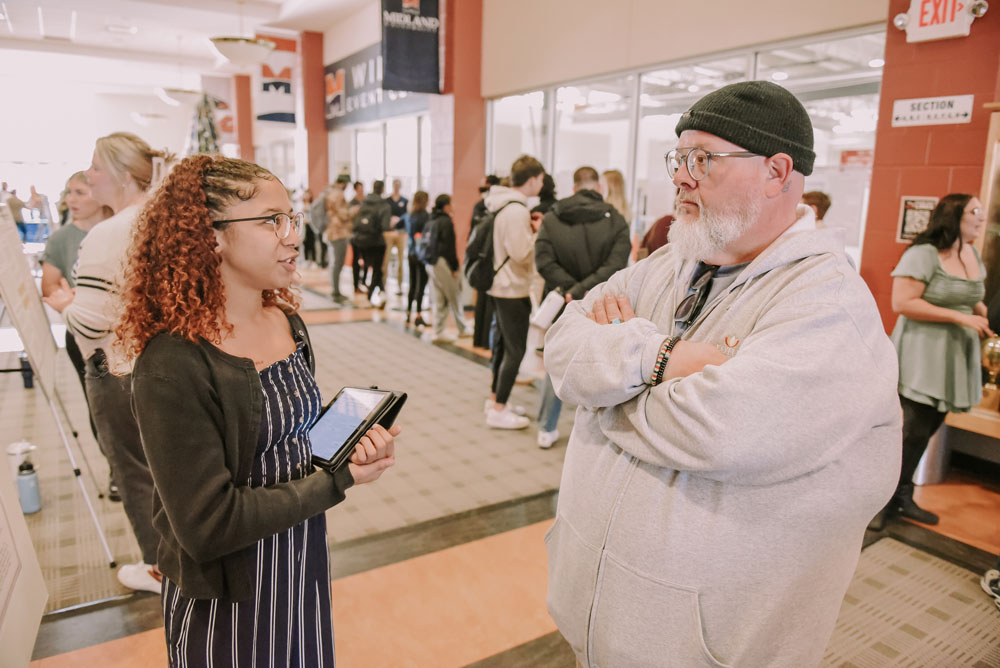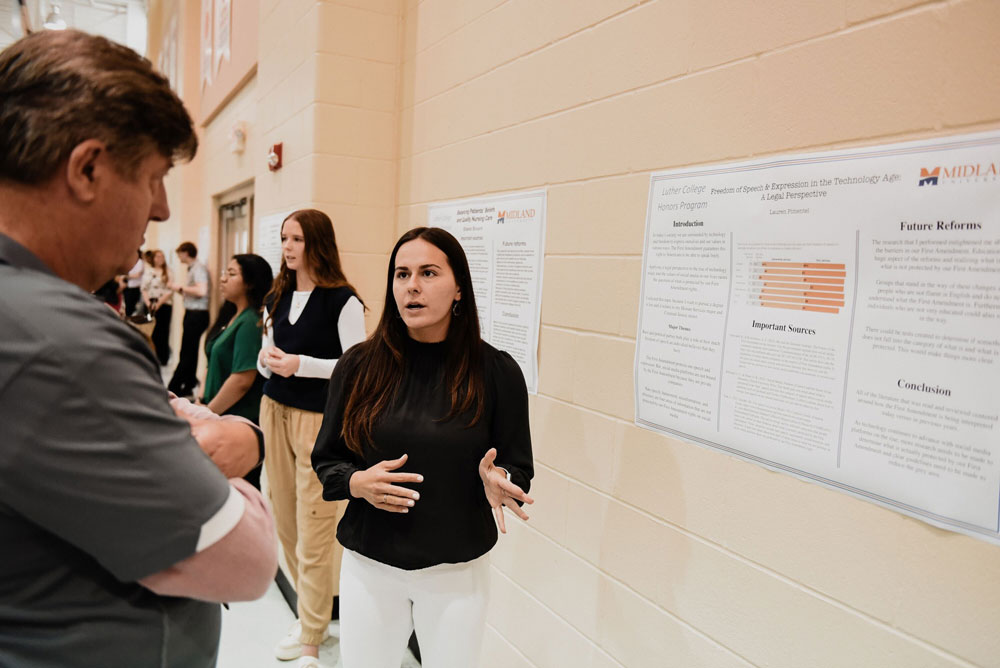Research Fair Provides Competitive, Learning Experiences for Midland University Students
While there is value in a student being able to share what they have learned in front of a classroom, sharing that knowledge with a room full of classmates, faculty, and community members has elevated those presentation skills to a new level.


Midland University students have the opportunity to present their findings each semester as part of the Spring and Fall Research Fair events. About 100 students participate each semester, and for the majority of them, it is part of their capstone experience.
Jamie Simpson, Chief Academic Officer, and Megan Nielsen, Dean for the Luther College of Arts & Sciences, helped get the Research Fair off the ground a dozen years ago. From its humble beginnings, the Research Fair has evolved and expanded over the years and involves many disciplines, including History, Sociology, Psychology, Communication Studies, English, Math, Biology, Youth & Family Ministry, Religion & Philosophy, and Honors students.
Simpson said students will pick a topic that falls within their discipline at the start of the semester and begin preparing for their presentations, with the Research Fair taking place near the end of each semester. “They are offered a lot of flexibility in terms of researching, collecting data, then putting that data together,” Simpson said. “Some will work as individuals while other subjects that require more in-depth research will allow them to work as teams.”
Students will put their collected data on a poster board, which will be used as part of their presentation. Their presentations are also recorded and put online. During the Research Fair, students must present to at least two judges, as well as other faculty/staff members, community members, and even family. Simpson said most students will give their presentations 5 to 10 times during the Research Fair. Students can’t be judged by their own professors, but they are graded on their presentation information and skills.
Colby Tichota, a recent Midland graduate and Accounting major, took part in three Research Fairs while a member of the Howard Hanson Honors Program at Midland. Presenting to a room full of people you might not know, as opposed to your classmates, presents new challenges, but the experience gained was invaluable. “The value of the Research Fair is having the confidence to present to a stranger,” he said. “In a classroom setting, the environment is more controlled, and the professor knows and understands the topic they are grading for. In the Research Fair, you may or may not know the judge, and that judge may or may not know the topic. You have to adjust how you present your topic to allow the audience to grasp the subject. You have to be able to present in a way that keeps the audience intrigued and interested by the presentation.”
Tichota said he spent multiple hours prepping for his presentation, and being able to practice several times allowed him to be in a comfort zone when the lights came on. “I did my online narration many times, and with each practice, I emphasized my main points and built a presentation that flowed and kept the audience engaged,” he said. “That allowed me to feel comfortable during the presentation.”
Speaking to a room full of strangers may not be high on a student’s priority list, but Simpson found out the significance of the Research Fair in the spring of 2020. “When Covid hit, we weren’t able to have the Research Fair in person, and students were genuinely disappointed,” she said. “This is a lot of work for them, and they are excited to be able to present their findings.
“For many of them, this is the first time they have the opportunity to present work outside of the classroom. They develop so many skills through the Research Fair, including managing a project, time management, research and critical thinking, and communication skills. It really helps our students focus on their academic experience.”
In many ways, Tichota views the Research Fair as an opportunity to practice job interview skills. “The presentation feels like a simulation,” he said. “I imagined the Research Fair as if I were giving this presentation to a future manager or boss. I want to come across as confident and compelling so the audience respects, and is intrigued, by the information I present.”
Another layer of the Research Fair is the competitive spirit it brings out in each student. First and second-place awards are presented in two different categories. “It can get very competitive within the classrooms and the different disciplines,” Simpson said. “Part of the reason we invite families is because we want these students to be able to show off what they have learned to the people who have supported them over the years. They’ve done the hard work to get to this point, so the Research Fair is kind of the cherry on top for them.”
The Research Fair is also an important part of the DRIVE (Digital Fluency, Research & Critical Thinking, Innovation, Vocation & Leadership, Engagement & Expression) frameworks, which serves as Midland’s Academic Core Experience. “The Research Fair is just one piece of the DRIVE skills they are learning, so our goal is to continue to expand and highlight the different work our students are doing,” Simpson said.
Simpson said the Research Fair is a key component in a student’s growth at Midland and will help prepare them for entering a competitive workforce. “It allows our students to go from consumers of knowledge to creators of knowledge,” she said. “They are asking new questions that they don’t know the answers to until the research is done. It’s fun to see them make that leap from being a student who is passively absorbing information to a student who is now presenting and coming up with new solutions.”